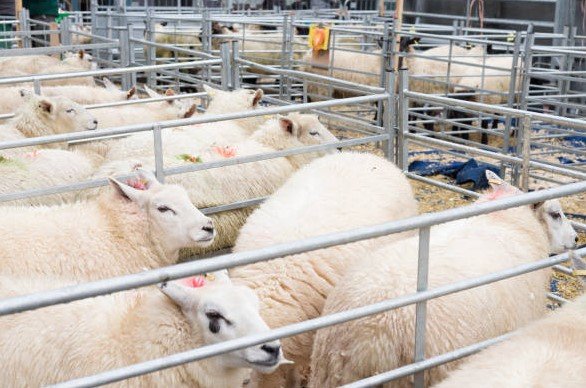Saudi Arabia is set to enforce a landmark change in how live animals are bought and sold — by weight, not guesswork. The Ministry of Environment, Water, and Agriculture says this is about fairness, health, and transparency, and will go live this Thursday.
The new rule doesn’t just touch the scales — it shakes the whole livestock marketplace. From market pens to slaughterhouse logistics, sellers and buyers alike will need to adjust. And fast.
Livestock Sales Go Digital… and Measurable
For years, many livestock deals in Saudi Arabia relied on visual estimates and negotiation. It’s an old-school method — and one that often favored sellers. Now, the government wants the math to do the talking.
This is no symbolic move. It’s part of a broader economic shift under Saudi Vision 2030.
Every animal meant for slaughter must now be weighed with certified scales — and those weights must be recorded, monitored, and shared. Think of it as a receipt on steroids.
The ministry says it’s about leveling the playing field.
And there’s structure behind the rollout too:
-
Pen tenants must install and maintain clean, calibrated digital scales
-
All weights must be visible to both buyer and seller at the time of transaction
-
Any dispute? Buyers can demand a re-weighing, no questions asked
-
Tampering with the scale? Automatic suspension and investigation
Enforcement Comes with Teeth
It’s not just lip service. The ministry’s inspectors will have sweeping rights to enforce the new rules. If a scale isn’t up to code or looks suspicious, it can be pulled out of use on the spot.
These aren’t idle threats.

Officials are being trained on how to handle weighing equipment, spot abuse, and flag discrepancies in market records. Every weighing operation must be logged with time, date, animal type, and any other info required by the supervising agency.
One government official told local reporters, “We’re not here to punish. We’re here to fix what’s broken.”
Still, if fraud is detected, penalties are expected to be swift — and possibly steep.
What’s Changing for Sellers on the Ground?
For livestock traders, especially in public markets, this could feel like a culture shock.
Eyeballing animals for deals has been a part of traditional trade for generations. Some sellers say weighing removes that “personal feel” of the deal. Others worry it slows down transactions, especially in peak seasons like Eid.
But not everyone’s upset. In fact, some say the shift was overdue.
“It’s about time,” said Nasser Al-Harthi, a livestock seller in Riyadh. “Too many people have been guessing, or worse, lying. This makes it clean. I don’t want to argue with customers anymore — just show them the number.”
That said, he’s still waiting on his scale delivery. “I ordered two. They’re delayed. Everyone’s rushing to get ready.”
Consumer Trust May Be the Real Prize
On the flip side, consumers — especially buyers from slaughterhouses and hotels — see this as a win.
“No more overpaying for an underweight goat,” joked one butcher at the Al-Aziziyah market. “We’ll finally pay for what we’re actually getting.”
There’s also a health angle. Clean scales and better recordkeeping mean less disease spread, especially during hot summer months. Stressed or injured animals often yield poor meat quality. Accurate weighing reduces that risk.
And in a country where livestock is a vital part of cultural celebrations and religious rites, the impact is personal as well as financial.
What the Rules Actually Say
Let’s break down the regulation in a table for easy reference:
| Regulation Item | Details |
|---|---|
| Scope | Applies to all livestock prepared for slaughter |
| Location | Inside and outside designated pens |
| Scale Requirement | Digital, certified, regularly cleaned and maintained |
| Recordkeeping | Mandatory: date, weight, species, location |
| Transparency | Buyer must see the reading; reweighing allowed |
| Fraud Prevention | Scale tampering banned; inspectors can suspend equipment immediately |
| Penalties | Violations may result in fines or license suspension |
Even the tone of the regulation signals urgency. This isn’t a slow-burn reform — it’s a full-on reset.
Why This Move Now?
It’s all part of a larger story.
Saudi Arabia has been working to reshape its agricultural, health, and food safety standards for years. This latest step ties into the bigger picture — a move away from informal markets and toward traceability, food security, and global-standard compliance.
Officials hope that better standards now could help the Kingdom become a major livestock exporter down the line.
But it’s not just about exports.
The ministry sees this as a national health issue. Better data means better regulation, which means fewer foodborne illnesses, cleaner meat, and fairer prices across the board.
And with Hajj season and Eid al-Adha around the corner, timing couldn’t be more critical.
Industry Eyes Bigger Picture — With Some Caution
Of course, not everyone’s thrilled.
Some livestock traders say the government is trying to fix a system that wasn’t broken — just misunderstood. Others worry the cost of scales, training, and compliance could hit small market players hardest.
But overall, most believe it’s the direction Saudi Arabia is heading anyway. And they’d rather be ahead of the curve than crushed by it.
One operator from Qassim said bluntly, “If I don’t adapt, I’ll be out of business.”
Still, the new rules don’t apply to breeding animals or dairy herds — only to animals meant for immediate slaughter. That helps ease the pressure on certain rural suppliers who operate outside city markets.
For now, market stalls across Riyadh, Jeddah, and Dammam are scrambling to get ready. Scale suppliers say demand has spiked sharply in the last two weeks. Some sellers are pooling funds to buy shared equipment.
